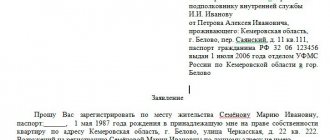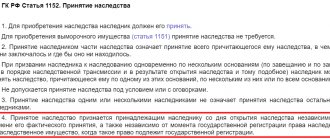Inheritance of real estate without privatization
According to the law, the privatization procedure is considered to be a mechanism for transferring state property into the personal property of an individual.
Real estate is considered the official property of the person living in it only after registration of the right to a residential property (registration of privatization). If such a procedure has not been carried out, potential heirs may experience a number of difficulties when registering the apartment as an inheritance under a will or by law.
If the testator dies before the completion of the privatization procedure, the residential property retains the status of state or municipal property. Accordingly, according to the law, the deceased is considered the tenant of the property, but not its owner.
3 ways to get a free consultation with a lawyer 01
-consultant in the online chat bottom right
02
Free call 8 (free consultation in Russia)
03
Request a call back (bottom left button), a lawyer will call you back in 10 minutes
Free consultation with an inheritance lawyer Prices for inheritance lawyer services
Who has the right to inherit a non-privatized apartment by law
The right to inherit an apartment belongs to a circle of persons recognized as the direct heirs of the deceased. According to the law, the heir has the right to petition for the inclusion of residential premises in the inheritance estate.
To successfully implement this process, it is necessary that the following procedures be completed before the death of the testator:
- Before his death, the testator submitted an application for privatization of the real estate property to the relevant registration authorities.
- Before the moment of death, the testator provided the relevant authority with a complete package of documents.
- At the time of the testator’s death, there is no fact that the application for housing registration has been withdrawn.
If the above circumstances exist, the heirs can include the non-privatized apartment in the inheritance estate (in accordance with Resolution of the Plenum of the Armed Forces of the Russian Federation dated August 24, 1993 No. 8).
It should be noted that the circumstances under which the testator died before state registration or before the execution of an agreement for the transfer of a residential property into his ownership are taken into account.
Possible sale options
Previously, the law did not provide for the sale or exchange of municipal apartments. However, in 2020 this procedure is possible, but it has its own risks and inconveniences.
Methods:
- Buyer registration. To do this, it is necessary to obtain the consent of all registered residents. The seller registers the buyer, and registers himself after receiving money from him. All costs for further privatization are borne by the buyer. The disadvantages of this method include paying a tax of 13%.
- Sale with further privatization. The disadvantages include a lengthy search for a buyer, as well as unnecessary expenses, which include paying a tax of 13%, as well as paying a state duty from 2 to 13 thousand rubles.
- Exchange. In addition to the lengthy search for a buyer, the seller must obtain the consent of the head of the municipal administration. Paying commissions to the agency also takes up a lot of money. To exchange housing from an agency, you need to purchase “buffer” housing from it and then sell it back.
Any of these options is costly and risky, so the best way to sell real estate would be initial privatization and its further sale.
Privatization
Everyone who is registered in the apartment has the right to it; after privatization, they become its owners. Persons over 18 years of age have the right to refuse it.
Owners of privatized apartments are given broad powers; they can:
- exchange an apartment with another tenant;
- provide housing for rent for any citizen within the framework of the law;
- receive utilities in full;
- receive major repair services free of charge.
So, a special procedure has been established for obtaining rights to non-privatized housing. Actual inheritance is impossible, since a municipal apartment belongs to the state and is considered its property. Therefore, the successors of the deceased person cannot inherit him.
In accordance with civil law, you can only inherit your own property. To succeed to a state apartment, it is necessary to re-register the social tenancy agreement to another person or privatize the housing.
Actions after the death of a citizen
According to the law (in accordance with the provisions of Article 672 of the Civil Code of the Russian Federation), family members of the tenant of the residential premises who lived in the apartment together with the testator have the right to live in the premises after the death of the testator (the main tenant).
Any of the relatives has the right to enter into an agreement for an apartment with the authority that provides housing from the state fund. Accordingly, the heir of a deceased citizen can act as a full party to a contract for non-privatized real estate and retain the right to live in the apartment.
Rights and obligations of the employer
The tenant of a residential premises under a social tenancy agreement has the right:
- move other persons into the occupied residential premises;
- sublease residential premises;
- allow temporary residents to live in residential premises;
- exchange or replace occupied residential premises;
- require the landlord to carry out timely major repairs, properly participate in the maintenance of common property in an apartment building, as well as the provision of utilities.
The tenant of a residential premises under a social tenancy agreement is obliged to:
- use the residential premises for their intended purpose and only within the framework of the social tenancy agreement;
- ensure the safety of living quarters;
- maintain the proper condition of the living space;
- carry out routine repairs of residential premises;
- pay rent and utilities on time;
- inform the landlord within the time period established by the contract about changes in the grounds and conditions giving the right to use residential premises under a social tenancy agreement.
The tenant of municipal housing undertakes to maintain the proper condition of the premises he occupies.
It is worth keeping in mind that only the owner of the property has the right to sell it. Due to the fact that the tenant of municipal housing is not the owner, he does not have such a right. In this case, there is the possibility of exchange. However, this requires obtaining permission from the landlord.
The procedure for exchanging non-privatized apartments is characterized by the following features:
- upon conclusion of the contract there is no transfer of ownership;
- exchange is possible only with the consent of all adult citizens living in both properties;
- when concluding a contract, written approval from both landlords is required, but their refusal is possible only on the grounds provided for in the Housing Code of the Russian Federation;
- an exchange agreement for non-privatized apartments cannot be of a compensatory nature, since tenants do not have the right to dispose of the property and receive money for it.
Conditions under which the exchange of residential premises under social tenancy agreements is not allowed:
- a claim has been brought against the tenant of the exchanged residential premises for termination or amendment of the social tenancy agreement for residential premises;
- the right to use the exchanged residential premises is disputed in court;
- the exchanged residential premises are recognized as unfit for habitation;
- a decision has been made to demolish the relevant house or renovate it for other purposes;
- a decision has been made to overhaul the relevant house with reconstruction and (or) redevelopment of residential premises in this house;
- as a result of the exchange, a citizen suffering from one of the severe forms of chronic diseases specified in the Housing Code of the Russian Federation (clause 4, part 1, article 51) moves into an apartment or house.
To do this, the tenant must obtain the written consent of the owner (municipality) and other residents. Part of the living space or the entire premises can be rented out (if the tenants leave temporarily). The subtenant does not receive the right to independently dispose of it and responsibility for its condition remains with the employer.
Subletting is not possible if:
- a person already lives (or moves in) there, suffering from diseases that make living together with him in the same apartment impossible;
- there is no consent of all residents and the municipality;
- after the subtenants move in, each tenant has less than 10 square meters. m. area.
In addition to the tenant, the following may live in a municipal apartment:
- spouse;
- children;
- parents;
- other relatives;
- dependents who were accommodated as family members.
Members of his family and other relatives may live with the tenant in municipal housing.
These citizens have competence at the level of the tenant. Members of the tenant's family who are capable and limited by the court in legal capacity are jointly and severally liable with the tenant for the obligations arising from the social tenancy agreement. The temporary absence of the employer or family members living with him does not entail a change in their rights and obligations under the social tenancy agreement.
In order to register other citizens as family members living with him/her, written permission from the landlord will also be required. The latter may refuse, subject to violation of the regulated area per tenant. There is no requirement to obtain permission to move in only young children whose parents are registered in a municipal apartment.
Outsiders move in temporarily, for no more than six months. If for some reason the owner refuses to move in, you can go to court about the unlawfulness of the action. Non-permanent residence is not a reason for eviction if all terms of the contract are met. When it is agreed upon for a new tenant to move in, he is included in the rental agreement, and he becomes equal in rights among all residents.
Residents of the municipal square are required to pay a number of services and fees.
The payment includes the following:
- rental, maintenance and repair of housing (we are talking about current repairs);
- heating;
- water supply and sewerage;
- gas;
- electricity;
- garbage removal;
- cleaning the local area, etc.
The tenant of municipal housing is obliged to pay utility bills.
Citizens classified as low-income are exempt from paying rent. However, paying utility bills and maintaining the premises are their responsibilities.
The category of housing and communal services does not include major repairs.
You cannot obtain the right to a non-privatized apartment
The right to privatize real estate is given to a citizen not on the basis of inheritance, but under a social tenancy agreement. It should be taken into account that an heir who does not live in the same premises as the testator does not have the right to claim to inherit non-privatized living space.
Also, residential areas are classified according to the law and a category of objects is identified that are not intended for registration of ownership. Regardless of the presence of a will, heirs cannot register ownership of the following objects:
- Residential premises recognized as unsafe.
- Apartments in dormitories.
- Housing on the territory of closed military cities.
- Premises included in service establishments.
Required documents
To formalize the agreement, family members of the deceased must personally sign an application for concluding a DSA. The standard form is provided by the authority and contains information about the apartment and residents. If the person registered in the apartment cannot personally sign the application, then he must have the appropriate consent certified by a notary.
In addition to the application, you must document the facts necessary for drawing up the DSN and provide:
- passports and birth certificates of persons registered in the apartment;
- current social rental agreement;
- a certificate from the registry office confirming the death of the employer;
- previous employer's employment agreement;
- a certificate from the housing office confirming payment of arrears for utility services;
- extracts from l/s and house register.
To make changes to the lease agreement for the apartment, the agreement must be submitted to the management organization. If agreement has not been reached between family members, then the renewal of the contract will be considered in court. Without providing documents, registration will be denied on legal grounds.
Sometimes a power of attorney from a representative or permission from the guardianship and trusteeship authorities may be required. You must also provide:
- cadastral passport;
- technical documentation for the apartment;
- certificate of the number of registered persons.
After receiving confirmation, the citizen will be able to dispose of the received living space. After the conclusion of the agreement, the residents indicated in the application will have the authority to privatize the apartment.
A cooperative apartment that has been paid for but not registered as ownership is included in the inheritance estate. The absence of title documents for the property is grounds for excluding the apartment from the certificate of inheritance. The notary will not include such housing in the inheritance estate. There are two ways to solve the problem:
- Statement of claim to court;
- Submitting an application to the housing cooperative for re-registration of the owner.
Through the court
In this case, the receiver can file a claim in court to recognize ownership of the disputed square meters. The defendant in the process will be the local government body. A court decision that has entered into force can be used as a legal document. This is the basis for state registration of an object.
Peaceful solution
The second registration option is without trial. The exercise of the rights of heirs to a residential property can take place without a lawsuit. Close relatives of the testator who lived with him have a priority right to a cooperative apartment. First of all, these are spouses. To exercise his right, a successor from among close relatives (spouse, children), who lived together with the former owner, writes an application to the board of the cooperative. In it, he expresses his right to become a member of the housing cooperative in place of a deceased relative.
We suggest you familiarize yourself with How to evict a person from an apartment if he is not registered in it without a trial and is it possible to evict someone other than the owner without his consent?
Sometimes the question arises between several heirs as to who should become a member of the housing cooperative instead of the testator. In this situation, several persons may apply for the place of one former member of the housing cooperative. But the number of new members of the cooperative should not be higher than the number of rooms in the inherited cooperative apartment.
Privatization of rental housing
To begin the procedure for privatization of real estate, the heir of a deceased citizen who has entered into a social tenancy agreement is required to contact the registration authorities (the application is sent to the place of residence).
The interested party is required to fill out a standard application form and provide authorized persons with a package of documents confirming his rights to the property subject to privatization.
The citizen is required to provide the following documentation:
- Russian citizen passport.
- Applicant's registration papers.
- Extract (certificate) for a real estate object from the BTI.
- Housing order.
- Social tenancy agreement (under a social tenancy agreement the document must be drawn up by the applicant).
- Extract from the house register. The document must contain information about the citizens living in the premises.
- A power of attorney (the document must be certified by a notary), required by a representative acting as a party to a social tenancy agreement.
Social tenancy agreement
The basis for living in a municipal apartment is a social tenancy agreement (STN). How the document is drawn up and what is included in its contents is provided for in the Housing Code (Article 60).
The DSN determines the rights and obligations of the tenant. In addition, it states:
- a list of the employer's family members who live with him;
- hiring period;
- procedure for paying for housing.
After the death of a citizen, the right to use the apartment passes to the registered residents on the basis of a social tenancy agreement.
Often, relatives have disagreements, and with them a desire to make changes to the DSN (Article 82 of the RF Housing Code). To deprive a person of the right to live in public housing, you need to go to court.
Re-registration of a municipal apartment after the death of the responsible tenant is carried out according to the established procedure. The following is submitted to the authorized body:
- Statement. The notarized consent of other residents to such an action is attached to it.
2. Passport.
3. Certificate about the composition of the family living in the premises being designed.
Local authorities may make adjustments to the list of documents provided, but within the framework of legal requirements.
After receiving the contract, the personal account is transferred to the new tenant, and the deceased is removed from the registration register.
To re-register a social tenancy agreement, you need to visit the regional government body that manages the municipal housing stock - the Department of Housing Policy. It is part of the central apparatus of the Ministry of Construction and Housing and Communal Services. If there is no representative office of the Department in the city, its functions are performed by housing and communal services.
You need to contact the Department provided that the remaining relatives registered in the apartment agree to re-register the VAT.
You can also submit papers through the Multifunctional Center.
Collection of documents
First of all, the new employer writes an application for re-registration. The text indicates the need to amend the DSN in connection with the death of the tenant. The remaining registered residents sign the document. If one of them cannot appear in person to sign, you must provide his consent, certified by a notary.
In addition to the application, the following is submitted to the authorized body:
- Extract from the house register.
- A copy of the personal account.
- Old social tenancy agreement.
- Copies of passports of registered and living family members of the tenant.
- Death certificate of the employer.
Sometimes Department employees additionally require documents confirming relationship with the deceased employer.
Close relatives living with the employer are registered in the DSN and receive the same right to it and to participate in privatization. In other words, registered persons included in the contract have the same rights as the employer.
Changes to the DSN are made in accordance with these standards:
- Tenants of housing in a communal apartment are given the right to re-register individual contracts into a common document if they have become members of the same family (married).
- If the authorized body and the residents of the apartment agree, the contract can be reissued to a legally capable resident living in the apartment, as in the event of the death of the tenant.
Agreement on social the rental of an apartment is terminated:
- during gross violations of the terms of the contract;
- by agreement between the parties;
- if the premises cannot be used due to the seizure of the site, reconstruction or demolition of the house.
Termination of the contract at the initiative of the municipality is possible only through the court. Then he must provide the person with alternative housing.
According to Art. 4 No. 1541-1 of the Legislation of the Russian Federation, it is impossible to provide for use an apartment that is located in an environmental zone or in a closed military city, or if it is considered emergency or service.
How to re-register a municipal apartment after the death of a tenant? Since municipal housing is managed by the district administration, the application should be submitted there or to the MFC.
We suggest you read What to do if you were deceived and left without an apartment
Before contacting the municipality, family members must:
- remove the deceased employer from the registration register;
- decide which relative will renew the contract;
- prepare a package of documents.
You also need to do the following:
- Check the status of the apartment so that it is acceptable for privatization, that is, it is not a service or emergency one.
- Collect the necessary documents and submit along with the application.
- Wait for a response within a month. Visit the administration together with all persons involved in privatization.
- Register property rights with Rosreestr during a personal visit.
- Obtain the right to dispose of housing. If the responsible tenant dies, the inheritance is carried out in accordance with the general procedure.
After re-registration of the DSN, the apartment can be privatized and used at your own discretion. All persons living in the apartment have the right to participate in privatization.
Only citizens living with the deceased employer can apply for renewal of the agreement, even if they are not related. If they do not exist, the municipal body has the right to transfer the right of use to other persons who are in no way connected with the previous owner.
The residential property is automatically returned to the city's housing stock. Citizens living in the apartment without rights must vacate their housing.
Consideration of an application for housing privatization
The package of documents collected by the heir is reviewed by the registration department. Authorized law enforcement agencies are checking the documents for accuracy (inquiries are made to the relevant authorities).
If no controversial issues arise, the heir appears at the registration department and draws up an agreement for the privatization of the apartment and the transfer of real estate into personal ownership.
The applicant takes legal ownership of the property only after drawing up and officially registering the contract. All information about the procedure is entered into the Unified Register and the apartment becomes the full property of the heir.
Will for a non-privatized apartment
The testator has the right to bequeath as an inheritance both property that is personally owned and property that is at disposal or may be received in the future.
In the process of drawing up a will, a citizen can bequeath any property (privatized and non-privatized, cash deposits, and so on). Moreover, the document may not indicate each immovable object separately.
The main role in the process of drawing up a will is given to the legal capacity of the owner - the citizen must be of sound mind and fully capable.
Author of the article: Petr Romanovsky, lawyer Work experience 15 years, specialization - housing disputes, family, inheritance, land, criminal cases.
Useful information on inheritance
- Entry into inheritance
- What documents are needed to enter into an inheritance?
- Inheriting an apartment
- Inheritance after the death of a relative
- Mandatory share in inheritance
- How to register an inheritance
- Certificate of right to inheritance
- Establishment of the fact of inheritance and recognition of property rights
- Restoring deadlines
- Opening time and place
- List of documents for opening an inheritance case
- Refusal of inheritance
- Application for acceptance of inheritance
- Selling an inherited car
- Opening an inheritance case
- Inheritance after wife's death
- Joint inheritance
- Escheated inheritance
- Documents for registration of inheritance
- Inheritance after mother's death
- Inheritance after the death of a husband
- Inheritance after the death of parents
- Registration of inheritance for an apartment
- Inheritance after father's death
- Protection of inherited property
- Division of inherited property
- Documents for inheriting an apartment
- The procedure for inheriting an apartment by law after death
- Inheritance of a non-privatized apartment
- Inheritance of a privatized apartment
- Application to establish the fact of acceptance of inheritance
- Inheritance without a will
- Limitation period for inheritance cases
- Application for inheritance
- Valuation of a plot for inheritance
- Disinheritance
- Car valuation for inheritance
- Inheritance by adopted children and adoptive parents
- Inheritance by right of representation
- Inheritance after the death of a son
- The procedure for inheriting cash deposits
- Inheritance of land plots
- Inheritance of loan debts
- Inheritance of unpaid amounts
- Actual acceptance of inheritance








